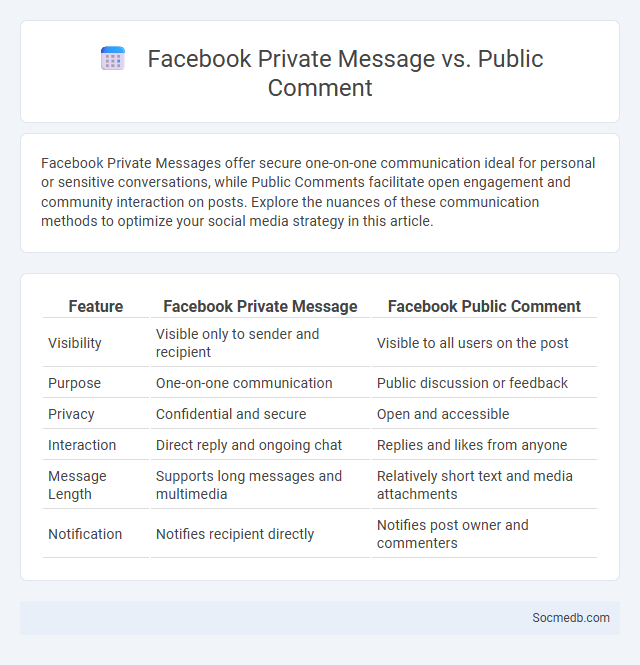
Photo illustration: Facebook Private Message vs Public Comment
Facebook Private Messages offer secure one-on-one communication ideal for personal or sensitive conversations, while Public Comments facilitate open engagement and community interaction on posts. Explore the nuances of these communication methods to optimize your social media strategy in this article.
Table of Comparison
| Feature | Facebook Private Message | Facebook Public Comment |
|---|---|---|
| Visibility | Visible only to sender and recipient | Visible to all users on the post |
| Purpose | One-on-one communication | Public discussion or feedback |
| Privacy | Confidential and secure | Open and accessible |
| Interaction | Direct reply and ongoing chat | Replies and likes from anyone |
| Message Length | Supports long messages and multimedia | Relatively short text and media attachments |
| Notification | Notifies recipient directly | Notifies post owner and commenters |
Understanding Facebook Private Messages
Facebook private messages enable direct communication between users, supporting text, images, videos, and voice notes within the Messenger platform. These messages are encrypted, ensuring user privacy and secure interactions. Understanding features such as message requests, unread indicators, and active status enhances user experience and efficient communication management.
What Are Facebook Public Comments?
Facebook public comments are user-generated responses visible to everyone on a post, making interactions transparent and engaging. These comments allow you to join conversations, share opinions, and provide feedback on public content from pages, profiles, or groups. Managing Facebook public comments effectively can boost your online presence and foster community engagement.
Defining Facebook Direct Messages
Facebook Direct Messages enable private, real-time communication between users on the platform, allowing you to send text, images, videos, and links securely. This feature enhances personal interaction and business engagement by facilitating instant, confidential conversations within Facebook Messenger. Managing your Facebook Direct Messages effectively ensures seamless connectivity and strengthens your social media presence.
Privacy Levels: Private Message vs Public Comment
Private messages on social media platforms ensure end-to-end encryption and restrict access solely to the sender and recipient, offering a higher level of confidentiality. Public comments, visible to a broader audience, lack these privacy safeguards and can be indexed by search engines, increasing the risk of data exposure. Users must carefully manage privacy settings to balance personal communication security with public interaction.
When to Use Direct Messages on Facebook
Use Direct Messages on Facebook to share private information, coordinate event details, or engage in personalized customer support. This method enhances confidentiality and allows for real-time interaction without public exposure. Businesses benefit by resolving inquiries efficiently and building stronger customer relationships through targeted communication.
Engagement Differences: Comment vs Private Message
Comment sections on social media promote public engagement by fostering community interaction, allowing users to share opinions and react visibly to other comments. Private messages drive one-on-one communication, offering personalized interactions that often lead to deeper conversations and stronger connections. Brands leveraging comments gain broader audience visibility, while private messages enhance customer support and personalized marketing efforts.
Visibility and Safety Concerns
Social media platforms enhance visibility for individuals and brands by enabling real-time content sharing and precise audience targeting through advanced algorithms. However, increased visibility raises safety concerns, including data privacy risks, cyberbullying, and identity theft, necessitating robust security measures and user vigilance. Implementing comprehensive privacy settings and educating users about safe online behavior are crucial to mitigate these challenges while maximizing social media's benefits.
Business Communication Best Practices
Effective business communication on social media requires clear messaging tailored to your target audience, ensuring content is relevant and engaging. Utilizing data-driven strategies and consistent branding enhances your company's credibility and fosters customer trust. Monitoring feedback and responding promptly to inquiries improves your brand reputation and strengthens relationships.
User Etiquette for Each Messaging Option
User etiquette on social media varies across messaging options such as direct messages, group chats, and public comments, emphasizing respectful language, timely responses, and privacy awareness. In direct messages, maintaining confidentiality and avoiding unsolicited promotional content enhances trust, while group chats require attentiveness to turn-taking and relevancy to prevent message overload. Public comments should prioritize constructive feedback and avoid inflammatory language to foster positive community engagement and minimize conflicts.
Choosing the Right Facebook Messaging Method
Choosing the right Facebook messaging method depends on your communication goals and audience preferences. For personalized interactions, Facebook Messenger allows direct, real-time conversations, while automated chatbots streamline responses for common inquiries and improve customer service efficiency. You can enhance engagement by selecting the messaging approach that best aligns with your brand voice and user expectations.
 socmedb.com
socmedb.com